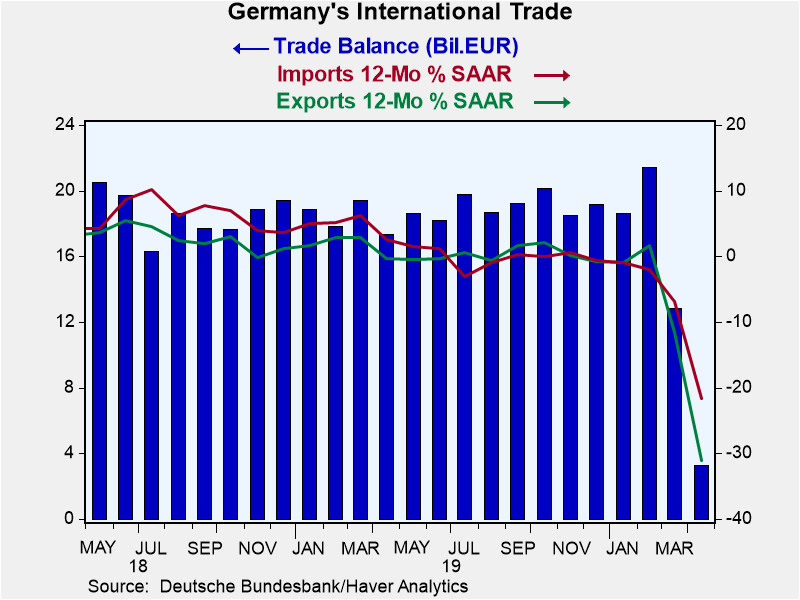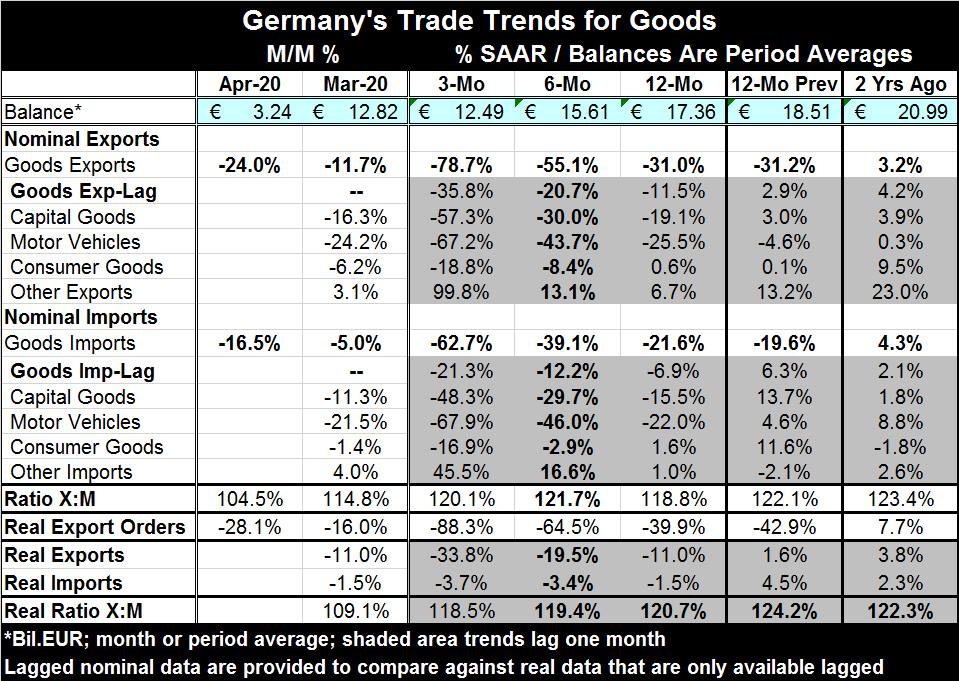 Global| Jun 09 2020
Global| Jun 09 2020All-Time Record Drop in German Exports
Summary
Germany has just logged trade data for April and the results are dismal to abysmal. The surplus that was €21.4bln in February dropped to €12.8bln in March and plunged to €3.2bln in April, an extremely rapid stepdown. This is the [...]
 Germany has just logged trade data for April and the results are dismal to abysmal. The surplus that was €21.4bln in February dropped to €12.8bln in March and plunged to €3.2bln in April, an extremely rapid stepdown. This is the lowest the German trade surplus has been since December 2000. The exports drop is the weakest that has been recorded on data back to 1950.
Germany has just logged trade data for April and the results are dismal to abysmal. The surplus that was €21.4bln in February dropped to €12.8bln in March and plunged to €3.2bln in April, an extremely rapid stepdown. This is the lowest the German trade surplus has been since December 2000. The exports drop is the weakest that has been recorded on data back to 1950.
This is also the sharpest two-month drop in the German surplus back to early-1990. April has been a bad month for economic statistics generally. Exports have a record one-month drop of -24% month-to-month while imports also fell sharply by 16.5% on the month.
Globally trade volumes continue to be pressured and the German economy that is very export-dependent is struggling. There is no denying the weakness that will be present until the global economy turns the corner on the pandemic. There already are economies reopening in Europe. These should help to usher in a period of growth and help German trade flows to recover.
German real export orders that do tend to lead German exports also are weak and have been weakening further. They fell by 16% in March then fell by another 28.1% in April. German exports appear to have a tough row to hoe for several months yet.

The virus economy
We continue to be in the grip of epidemiologists on the outlook. Even as economies are reopening there are cautioning statements about the risk of a second wave. On one hand, we are praised by some researchers for having had these massive lockdowns across Europe and in the U.S. that stopped the pandemic in its tracks. On the other hand, we are warned that because we stopped the pandemic in its tracks there are still a lot of people who have not yet been infected and can get and spread the disease, leaving us at risk. No large country has done a good job of protecting its at-risk population. Despite the fact that we have known for some time that this virus kills a lot of old people and that people with preexisting medical conditions are a greater risk and that concentrations of these people exist in nursing homes, no one seemed to really focus on how to deal with that risk. In the U.S., about 40% of deaths have been in nursing homes. The deaths of the already aged and infirmed have exaggerated the risk to the general population. My favorite reminder of this is NYC where in late-May 16,000 people had their death attributed to the coronavirus but fewer than 100 people who had no preexisting health issues had died in NYC. Despite statistics like that, that remind us that this virus picks its targets carefully. Countries’ political leaders continue to think in terms of general policies instead of in terms or policies to shelter the at-risk. No one is quite sure if anyone is going to be willing to listen to medical officials were they to try to engineer a second shut \down in the face of a second wave. Even some policymakers are skeptical that they could do it again. The future remains at risk. You could say our future has ‘gone viral.’
Robert Brusca
AuthorMore in Author Profile »Robert A. Brusca is Chief Economist of Fact and Opinion Economics, a consulting firm he founded in Manhattan. He has been an economist on Wall Street for over 25 years. He has visited central banking and large institutional clients in over 30 countries in his career as an economist. Mr. Brusca was a Divisional Research Chief at the Federal Reserve Bank of NY (Chief of the International Financial markets Division), a Fed Watcher at Irving Trust and Chief Economist at Nikko Securities International. He is widely quoted and appears in various media. Mr. Brusca holds an MA and Ph.D. in economics from Michigan State University and a BA in Economics from the University of Michigan. His research pursues his strong interests in non aligned policy economics as well as international economics. FAO Economics’ research targets investors to assist them in making better investment decisions in stocks, bonds and in a variety of international assets. The company does not manage money and has no conflicts in giving economic advice.
More Economy in Brief
 Global| Feb 05 2026
Global| Feb 05 2026Charts of the Week: Balanced Policy, Resilient Data and AI Narratives
by:Andrew Cates






